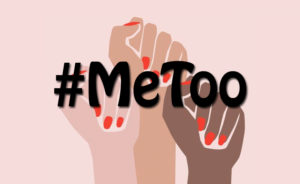Dovie Jenkins, Detroit, MI, USA, SSH Blog Correspondent
 #MeToo has been a boon to those seeking justice for the victims of sexual harassment and assault. However, celebrities and regular people alike have recently criticized #MeToo and other anti-harassment movements. One species of criticism claims that the individuals accused of harassment are merely exercising their expressive freedoms, like freedom of speech or the “right to pester.” The basic argument works like this: “Pesterers” have a right to exercise expressive freedoms, even if some find the exercise of these freedoms offensive. Constraining the exercise of these freedoms is an injustice. The #MeToo movement and others like it constrain the exercise of these expressive freedoms. So, the #MeToo movement and others like it, are unjust.
#MeToo has been a boon to those seeking justice for the victims of sexual harassment and assault. However, celebrities and regular people alike have recently criticized #MeToo and other anti-harassment movements. One species of criticism claims that the individuals accused of harassment are merely exercising their expressive freedoms, like freedom of speech or the “right to pester.” The basic argument works like this: “Pesterers” have a right to exercise expressive freedoms, even if some find the exercise of these freedoms offensive. Constraining the exercise of these freedoms is an injustice. The #MeToo movement and others like it constrain the exercise of these expressive freedoms. So, the #MeToo movement and others like it, are unjust.
I assert that this particular indictment of #MeToo fails: it is perfectly possible to exercise one’s rights in a way that warrants moral condemnation and sanction, and #MeToo is a reasonable response to these kinds of moral wrongs.
To understand this, consider the following hypothetical person. Jones enjoys saying whatever cruel thing pops into his mind. He tells a cashier that the cashier is a loser. He informs the bank teller that she is a fat idiot. When a Facebook acquaintance loses a parent, Jones comments “hahahhahaha.” It’s hard to deny that Jones has a right to say these things, but it’s also clear to most of us that Jones is doing something morally wrong. If the recipients of Jones’ cruelty started #JonesisaJerk to call attention to the abuse they’ve suffered at Jones’ hands, we’d think this is reasonable. Furthermore, if Jones’ cruel behavior resulted in a hostile workplace, many think that it would be appropriate to sanction Jones. Like Jones, pesterers exercise their expressive rights in ways that make others feel hurt, afraid, uncomfortable, ashamed, and undervalued. We generally think that comments that cause needless harm are morally bad. The #MeToo movement calls attention to these comments, and like #JonesisaJerk, this is a reasonable response to moral wrongs. Furthermore, like the Jones case, it’s reasonable for others to react negatively to pestering behavior.
One might worry that there are two important points of dis-analogy between Jones and the pesterers: (1) Jones intended to be cruel, whereas pesterers intend to compliment the objects of their pestering; and (2) the content of Jones’ comments is insulting, whereas the content of pestering is complimentary, even if these compliments are sometimes phrased in vulgar ways. These differences, one might argue, are morally relevant. However, both objections fail for similar reasons. (2) presumes that the content of a comment is what makes the comment morally acceptable. “Fat idiot” is an insult, and therefore is morally wrong. “Hey beautiful” is a compliment and should therefore be regarded as morally acceptable. This attitude in fact ignores many of the experiences recounted with #MeToo, but even if we assume that the content of pestering is not overtly insulting, this objection doesn’t succeed. Imagine that Smith is particularly sensitive about her appearance. Jones knows this. However, since Jones is a jerk, he sarcastically comments “hey beautiful” as she walks past. As predicted, Smith feels uncomfortable and self-conscious as a result. Though the content of Jones’ comment is superficially complimentary, the intent to cause Smith discomfort is enough to make Jones’ comment wrong.
This brings us to (1). Some claim that, unlike Jones, pesterers do aim to compliment pesterees. They argue that sometimes these efforts are misguided and miss the mark, but #MeToo and other anti-harassment initiatives ultimately penalize individuals for well-intentioned gestures. However, one of the following must be true: either pesterers know that the objects of pestering resent these “compliments” or the pesterers do not know this. If the pesterers know that these “compliments” are unwelcome and cause distress, then the pesterers don’t have benevolent motives. If the pesterers do not know how individuals respond to their comments, then they have failed to be a responsibly informed citizen (there’s considerable evidence that these comments cause distress), and this is a moral failing. In either case, (1) doesn’t cut it.
#MeToo and other grassroots anti-harassment initiatives raise a number of important questions about what should be done about harassment. However, I have shown that an appeal to the expressive rights of harassers/pesterers is not a satisfactory moral objection to anti-harassment movements. Sexual pestering is morally wrong for the same reason that bullying is wrong- it causes needless distress in its targets. The moral wrongness of pestering/harassment is compatible with the exercise of expressive freedoms. Most importantly, given that pestering is morally wrong, #MeToo and other anti-harassment initiatives rightly call attention to this abuse.
Dovie is a Graduate Teaching Assistant at Wayne State University in Detroit, Michigan, where she is currently pursuing an M.A. in Anthropology and Philosophy. Dovie’s academic interests include the evolution of moral reasoning, moral psychology, ethics, and epistemology. She is also interested in public philosophy, specifically issues relating to gender equality.
